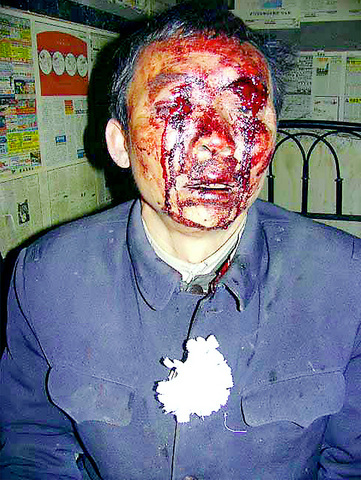China has detained dozens of people, some of whom have been severely beaten, for trying to mark the death of former leader Zhao Ziyang (
The allegations came as the government intensified security to prevent mourners attending tomorrow's funeral in Beijing for Zhao, the former Communist Party secretary-general purged for opposing the 1989 military crackdown on the Tiananmen democracy movement.

PHOTO: AFP
At least three people, including a woman in her 70s, were punched and manhandled by police officers outside the government offices which receive complaints in the Chinese capital, witnesses said.
They were among some 60 people who pinned white paper flowers to their clothes -- a traditional Chinese symbol of mourning -- said a bystander, who took pictures of the beatings and posted them on overseas Web sites.
"A man from Henan Province was beaten badly. His left eyeball looked like it was beaten out of its socket and he had a one inch cut to his right eye," said the man who requested anonymity.
"An elderly woman from Shandong Province was beaten to a point where she couldn't move and a man from Hunan Province was also beaten," he said.
Police shouted at the petitioners that Zhao, who spent nearly 16 years under house arrest until his death last week, was a "political criminal," the witness said.
"They said: `Why are you commemorating him? You're clearly opposing the government.' But the petitioners said `We think differently. We think he's a good person,'" the witness said.
Also last week, an estimated 80 to 90 petitioners were rounded up near Zhao's traditional courtyard home in Beijing for trying to get inside to pay respects and express condolences to his family, petitioners said.
"In our petitioners' hostel, all 10 people who went were detained and held from from 9am to 11pm," said Bai Shuhua, one of the 10.
"In the police station they said, `You don't seek leaders who are alive, but insist on seeking dead leaders. How can the dead help you?'" Bai said.
One of the petitioners, Liu Hongbo, was punched twice as he yelled "Zhao didn't do anything wrong," Bai said.
Zhao, premier and head of the Communist Party for much of the 1980s, died on Jan. 17 at the age of 85.
The authorities fear his death and funeral tomorrow will be a rallying point for dissidents, petitioners and people dissatisfied with the government.
Sources said invitations have been issued for the ceremony, following days of wrangling between party officials and relatives over the content of a eulogy to Zhao.
The government confirmed earlier that it would allow a "body farewell ceremony" for Zhao. It was not immediately clear how this would differ from a funeral.
But a government statement departed from the usual Chinese phrase for a funeral, apparently to reflect the lower status it accords to the event compared with the larger scale funerals normally arranged for former Communist Party leaders.

SECURITY: As China is ‘reshaping’ Hong Kong’s population, Taiwan must raise the eligibility threshold for applications from Hong Kongers, Chiu Chui-cheng said When Hong Kong and Macau citizens apply for residency in Taiwan, it would be under a new category that includes a “national security observation period,” Mainland Affairs Council (MAC) Minister Chiu Chui-cheng (邱垂正) said yesterday. President William Lai (賴清德) on March 13 announced 17 strategies to counter China’s aggression toward Taiwan, including incorporating national security considerations into the review process for residency applications from Hong Kong and Macau citizens. The situation in Hong Kong is constantly changing, Chiu said to media yesterday on the sidelines of the Taipei Technology Run hosted by the Taipei Neihu Technology Park Development Association. With

CARROT AND STICK: While unrelenting in its military threats, China attracted nearly 40,000 Taiwanese to over 400 business events last year Nearly 40,000 Taiwanese last year joined industry events in China, such as conferences and trade fairs, supported by the Chinese government, a study showed yesterday, as Beijing ramps up a charm offensive toward Taipei alongside military pressure. China has long taken a carrot-and-stick approach to Taiwan, threatening it with the prospect of military action while reaching out to those it believes are amenable to Beijing’s point of view. Taiwanese security officials are wary of what they see as Beijing’s influence campaigns to sway public opinion after Taipei and Beijing gradually resumed travel links halted by the COVID-19 pandemic, but the scale of

A US Marine Corps regiment equipped with Naval Strike Missiles (NSM) is set to participate in the upcoming Balikatan 25 exercise in the Luzon Strait, marking the system’s first-ever deployment in the Philippines. US and Philippine officials have separately confirmed that the Navy Marine Expeditionary Ship Interdiction System (NMESIS) — the mobile launch platform for the Naval Strike Missile — would take part in the joint exercise. The missiles are being deployed to “a strategic first island chain chokepoint” in the waters between Taiwan proper and the Philippines, US-based Naval News reported. “The Luzon Strait and Bashi Channel represent a critical access

Pope Francis is be laid to rest on Saturday after lying in state for three days in St Peter’s Basilica, where the faithful are expected to flock to pay their respects to history’s first Latin American pontiff. The cardinals met yesterday in the Vatican’s synod hall to chart the next steps before a conclave begins to choose Francis’ successor, as condolences poured in from around the world. According to current norms, the conclave must begin between May 5 and 10. The cardinals set the funeral for Saturday at 10am in St Peter’s Square, to be celebrated by the dean of the College